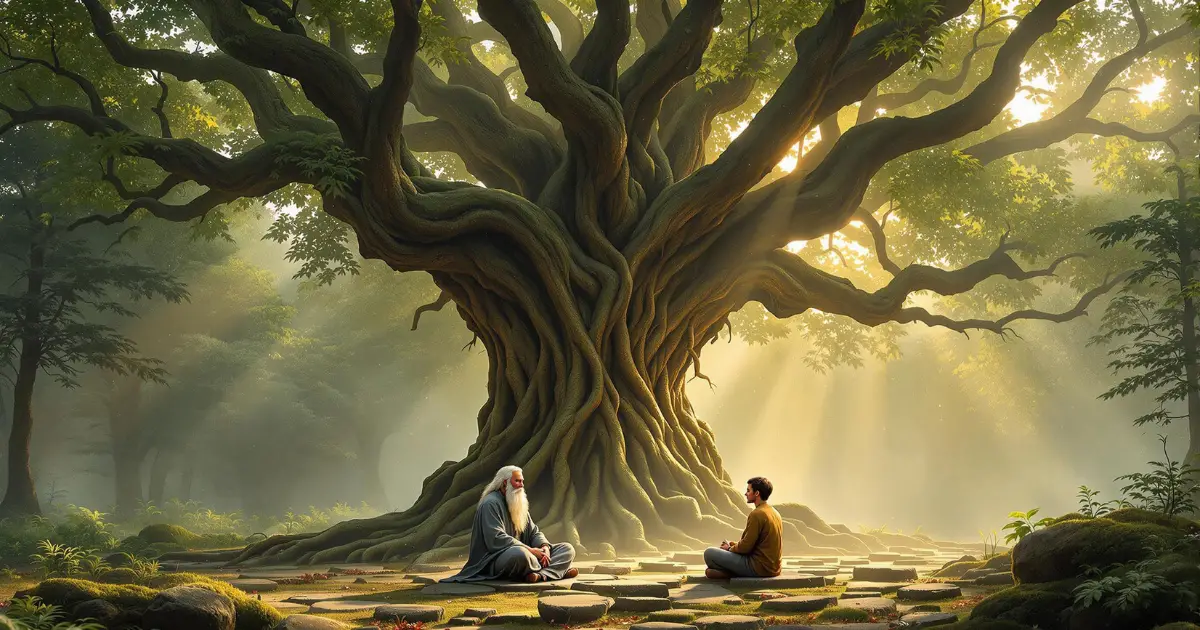December 27th, 2024
Guest writer for Wake Up World
Dialogues Between Master and a Spiritual Seeker on the Nature of Enlightenment.
On a quiet, misty morning, as the first rays of the sun filtered through the branches of the trees, the Seeker sat down before the Master under an ancient oak. The gentle rustling of leaves and the distant song of birds filled the air.
Seeker: Master, what is enlightenment? I hear so much about it, but I don’t really understand what it is.
Master: Enlightenment is nothing more than the recognition of what has always been present. It’s not something you attain or acquire; it’s the falling away of illusions.
Seeker: Illusions? What do you mean?
Master: Illusions are the false beliefs your mind clings to—the belief that you are a separate, independent “self” existing in a separate world.
Seeker: But if I’m not the “self,” then who am I?
Master: Your question holds the key to the answer. The “self” is just a thought, an idea. What you truly are is boundless awareness, within which all experiences appear and disappear.
Seeker: Then why do I feel so separate?
Master: Your mind is conditioned to label, judge, and distinguish. This creates the illusion of separation. But if you turn your attention away from the contents of the mind and focus on the source of attention itself, the illusion dissolves.
Seeker: How do I find the source of attention?
Master: Begin by simply sitting in silence and observing your thoughts without interfering. Then ask, “Who is observing this?” Don’t answer with thought; remain in the openness of the question.
Seeker: And this will lead to enlightenment?
Master: It won’t lead you to it; it will reveal that you are already enlightened. Your true nature cannot be attained because it has never been lost.
Seeker: Why don’t I feel that now?
Master: Because you are searching for what you already are. It’s like trying to see your own eyes with your eyes. Let go of the search, and you’ll see that what you’ve been seeking has always been here.
Seeker: So, enlightenment isn’t some special state?
Master: No, enlightenment is what is present right now when you are not seeking something else. Life itself is enlightenment, but you can only experience it when you release the filters created by your thoughts.
Seeker: What should I do now?
Master: Nothing. Just be. Everything you’ve ever sought is already what you are. Simply allow it to recognize itself.
Seeker: It’s hard to accept this, Master. My mind keeps asking questions, doubting, wanting proof. How can I deal with this?
Master: The nature of the mind is to question, doubt, and seek. Don’t fight it. Simply observe how your mind operates, but don’t identify with it. Thoughts come and go, but you, the one who is aware of these thoughts, remain unchanging.
Seeker: So observation is the key?
Master: Yes, but don’t just observe your mind. Observe the one who is observing. What is it that is aware of everything? That awareness, that silent presence, is who you are.
Seeker: But how can it be this simple? People meditate, practice, and seek for decades…
Master: Simplicity is the hardest thing to accept. The mind thrives on complexity because it sustains it. Enlightenment, however, is like the sun—it always shines, regardless of whether clouds obscure it. Practices and meditation are only meant to clear away the clouds.
Seeker: Then what’s the point of spiritual practices?
Master: Practices don’t lead to enlightenment because it’s already here. But they help quiet the mind so you can see what has always been present. They’re like a broom that clears away the obstacles from the path.
Seeker: What happens after enlightenment? How does life change?
Master: Nothing special happens, and yet everything is different. The world remains the same, but you no longer identify with it. You’re no longer trying to control life, nor is life controlling you. You simply flow with it. Suffering ends because you’re no longer attached to what comes and goes.
Seeker: And what about emotions? Pain, loss, fear?
Master: Emotions still arise, but they no longer affect you deeply. They’re like waves on the surface, but you are the depth. The awareness that recognizes these emotions remains untouched.
Seeker: But doesn’t that make a person indifferent?
Master: Quite the opposite. The heart of an enlightened person is full of compassion and love. But this love doesn’t come from attachment; it arises from the recognition that everything and everyone is part of the same unity.
Seeker: So enlightenment is really a return to the fullness of life?
Master: Yes. Life has always been full. Only the veil of ignorance prevented you from seeing this. Enlightenment is simply the recognition that you were never separate, that nothing was ever missing.
Seeker: I feel the truth of this, but it still seems like I’m far from it.
Master: That’s just a thought. Observe this feeling: “I’m far from it.” Who is it that experiences this?
Seeker: Perhaps… it’s me.
Master: Exactly. And this “me” is just a story, a concept. Stay silent and recognize that you are the silent presence that holds all of this in awareness. That is the key to enlightenment.
Seeker: Thank you, Master. I’m beginning to understand.
Master: Don’t try to understand. Just be. The truth is there in the silence, beyond the mind.
The Seeker fell silent and gazed at the slowly dissolving mist. The Master’s words turned into stillness within him, and he felt something beyond words—a sense of the sun and its rays, in which he too was shining.
Excerpt from Frank M. Wanderer’s new book, The Enlightenment.
About the author:
 Frank M. Wanderer, Ph.D is a professor of psychology, a consciousness researcher and writer. With a lifelong interest in the mystery of human existence, Frank’s work is to help others wake up from identification with our personal history and the illusory world of the forms and shapes, and to find our identity in what he calls “the Miracle”, the mystery of the Consciousness.
Frank M. Wanderer, Ph.D is a professor of psychology, a consciousness researcher and writer. With a lifelong interest in the mystery of human existence, Frank’s work is to help others wake up from identification with our personal history and the illusory world of the forms and shapes, and to find our identity in what he calls “the Miracle”, the mystery of the Consciousness.
You can follow Frank online at:
Frank is also the author of the following books:
- The Revolution of Consciousness: Deconditioning the Programmed Mind
- The Flames of Alertness: Discover the Power of Consciousness!
- The Biggest Obstacle to Enlightenment: How to Escape from the Prison of Mind Games?
- … and several other books on consciousness and the process of enlightenment.
Aging and dying are natural, yet society often teaches us to resist them. Sandra Ingerman offers a transformative perspective, revealing how these life stages hold profound spiritual meaning. In the free online video event Explore Death as a Rite of Passage With Shamanic Wisdom, you’ll learn to embrace these transitions with peace and gratitude.
Through shamanic practices, Sandra will guide you in releasing fears and uncovering the sacred lessons hidden in aging and death. You’ll experience a powerful, guided journey into nature’s wisdom, gaining insight into the interconnected cycles of life and death.
Don’t let fear of the unknown hold you back from living fully. Join Sandra for this free online event to discover tools and insights that will forever change how you view life’s transitions. Register Here
If you’ve found value in our articles, we invite you to support the release of our brand-new book, “Gratitude Practices for Kids: A Practical Guide for Adults to Instill a Spirit of Appreciation and Positivity in the Next Generation.“
“Gratitude Practices for Kids” brings together over 25 innovative and accessible practices designed to enhance gratitude in everyday life. This comprehensive guide is backed by 17 scientific studies, ensuring each concept is grounded in research, underscoring our commitment to nurturing growth, emotional intelligence, and positive interactions between adults and children.
We encourage you to opt for the paperback version to celebrate this new release. Dive into its fresh pages away from digital distractions, allowing you to immerse yourself in the transformative practices it offers.
Over recent years, Wake Up World has faced significant online censorship, which has impacted our financial ability to operate. Moving into book publishing represents a strategic step to secure the ongoing funds needed to continue our mission. By purchasing Gratitude for Kids, you help us keep our content free and accessible to everyone, avoiding needing a paywall. With over 8,500 articles published in the last 13 years, we remain dedicated to keeping our valuable content open to all.









